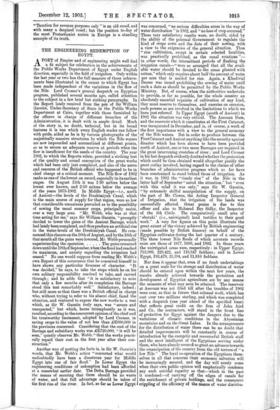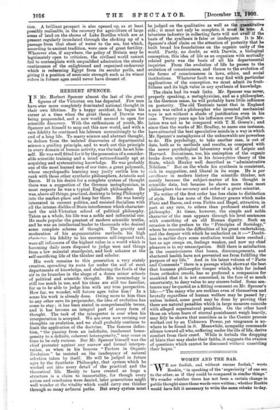THE ENGINEERING REDEMPTION OF EGYPT. A POET of Empire and of
engineering might well find a fit subject for celebration in the achievements of the Public Works Department of Egypt under English direction, especially in the field of irrigation. Only within the last year or two has the full measure of those achieve- ments been illustrated in the extent to which Egypt has been made independent of the variations in the flow of the Nile. Lord Cromer's general despatch on Egyptian progress, published several months ago, called attention to the subject in a few brief but striking paragraphs. In the Report lately received from the pen of Sir William Garstin, Under-Secretary of State in the Public Works Department at Cairo, together with those furnished by the officers in charge of different branches of the Administration, it is dealt with in ample detail. Much of the story is, no doubt, technical, but in its broad features it is bne which every English reader can follow with pride, aided as he is by various photographs of the majestically massive structures by which the Nile waters are now impounded and accumulated at different points, so as to secure an adequate reserve at periods when the flow is insufficient for the needs of the country. The year 1902, to which the Reports relate, provided a striking test of the quality and sound conception of the great works which had. been only just completed, and also of the nerve and resource of the British official who happened to be in chief charge at a critical moment. The Nile flow of 1902 ranks as one of the lowest on record, especially in its earliest stages. On August 15th it was 1-30 metres below the lowest ever known, and 2.50 metres below the average of the years 1873-1902. In Middle Egypt—i.e., north of Assiout—the levels of the Ibrahimiyah Canal, which is the main source of supply for that region, were so low that considerable uneasiness prevailed as to the possibility of sowing the usual summer crops, principally maize, over a very large area. "Mr. Webb, who was at that time acting for me," says Sir William Garstin, "promptly decided to lower the gates of the Assiout Barrage, which had lately been completed, and thus produce an artificial rise in the water-levels of the Ibrahimiyah Canal. He com- menced this closure on the 10th of August, and by the 16th of that month all the gates were lowered, Mr. Webb personally superintending the operation The gates remained downuntil the 19th of September, when the flood had reached its maximum, and anxiety regarding the irrigation had ceased." No one would suppose from reading Mr. Webb's own Report of this occurrence that he conceived himself to have shown any particular firmness of character. "It was decided," he says, to take the steps which he on his own solitary responsibility resolved to take, and carried through ; and he adds that "it is satisfactory to note that only a few months after its completion the Barrage stood this test remarkably well." Satisfactory, indeed ; but still more so that there was a British official in charge who, without trying to refer to his absent chief, faced the situation, and ventured to expose the new works to a test which, as Sir W. Garstin truly says, was "severe and unexpected," but which, borne triumphantly as it was, resulted, according to the concurrent opinion of the chief and his trustworthy lieutenant, adopted by Lord Cromer, in saving crops to the value of not less than £E600,000 in the provinces concerned. Considering that the cost of the Barrage and subsidiary works was .2E720,000, "it will be seen, quietly observes Mr. Webb," that the works practi- cally repaid their cost in the first year after their con- struction."
Another way of putting the facts is, in Sir W. Garstin's words, that Mr. Webb's action "converted what would undoubtedly have been a disastrous year for Middle Egypt into one of fair flood." In Lower Egypt the engineering conditions of redemption had been afforded at a somewhat earlier date. The Delta Barrage provided the means of securing that there should be no waste of water, and that full advantage should be taken of the first rise of the river. In fact, so far as Lower Egypt was concerned, "no serious difficulties arose in the way of water distribution "in 1902, and "no loss of crop occurred." These very satisfactory results were; no doubt, aided by the ability of the paternal Government to regulate the kind of crops sown and the date of their sowing, with a view to the exigencies of the general situation. Thus "rice cultivation, except in certain selected localities, was practically prohibited, as the canal rotations "- in other words, the intermittent periods of flushing the irrigation canals—" were so arranged that all the avair- able water should be devoted to the areas planted with cotton," which only requires about half the amount of water per acre that is needed for rice. Again, a Shedivial Decree was issued prohibiting the sowing of maize until such a date as should be permitted by the Public Works Ministry. But, of course, when the authorities undertake to provide, as far as possible, for the whole country an absolutely essential requisite of cultivation of any kind, they must reserve to themselves, and exercise on occasion, such powers as are involved in the limitations to which we ha.ve just referred. In Upper Egypt (south of Assiout) in 1902 the situation was very critical. The Assouan Dam, and the reservoir which it constitutes at the First Cataract, was inaugurated in December, and is, of course, a work of the first importance with a view to the general economy of the Nile waters. But in order to produce between the First Cataract and Assiout anything like the security against disaster which has been shown to have been provided north of Assiout, one or two more Barrages are required in the great intervening stretches of river ; and Lord Cromer in his last despatch evidently doubted whether the protection which could be thus obtained would altogether justify the great outlay involved, having regard to the claims of other branches of administrative progress which so far have been constrained to stand behind those of irrigation. As it was, in 1902 the "timely rise" of the Nile in the latter half of September" saved the situation," but "even with this relief it was only," says Sir W. Garstin, "by extremely skilful manipulation of the supply, on the part of Mr. Clowes, the Acting Inspector General of Irrigation, that the irrigation of the lands was successfully effected. Great praise is due to this officer and also to Mahmud Bey Sidky, the Inspector of the 5th Circle. The comparatively small area of sharaki ' (i.e., unirrigated) land testifies to their good work." A very few figures on this point illustrate the great extent of the victory achieved by British engineering (made possible by British finance) on behalf of the Egyptian cultivator during the last quarter of a century. The three lowest Nile floods of which accurate records exist are those of 1877, 1899, and 1902. In those years the unirrigated areas were, respectively : in Upper Egypt, 753,999, 229,422, and 116,847 feddans ; and in Lower Egypt, 193,479, 35,394, and 11,816 feddans.
Nor does it appear that, even if no fresh undertakings on a great scale for the storage and distribution of water should be entered upon within the next few years, the results already achieved towards the protection and development of Egyptian agriculture are by any means the measure of what may soon be attained. The reservoir at Assouan was not filled till after the troubles of 1902 were over, so that in future that colossal work, which has cost over two millions sterling, and which was completed with a despatch (one year ahead of the specified time) that reflects great credit on the firm of John Aird and Co., the contractors, will stand in the front line of protection for Egypt against the dangers due to the variations of climatic conditions in the Abyssinian mountains and on the Great Lakes. In the arrangements for the distribution of water there can be no doubt that detailed improvements will be constantly in course of introduction by the energetic and resourceful British staff and the most intelligent of the Egyptians serving under them, who have already secured so great an advance towards the emancipation of the country from the old terrors of "a low Nile." The loyal co-operation of the Egyptians them- selves in all that concerns their economic salvation will be increasingly secured, and the day will surely come when their own public opinion will emphatically condemn any such suicidal rapacity as that—which in the past it condoned—of carrying off the edges of canals for the enrichment of private holdings, and the consequent crippling of the efficiency of the means of water distribu- tion. A brilliant prospect is also opened up, as at least possibly realisable, in the recovery for agriculture of large areas of land on the shores of Lake Borillos which are at present regularly inundated through the choking up of a passage from that sheet of water to the sea, but which, according to ancient tradition, were once of great fertility. Wherever else, if anywhere, the policy of Britain may be legitimately open to criticism, the civilised world cannot fail to contemplate with unqualified admiration the steady continuance of the enlightened and organised endeavour which is redeeming Egypt from its secular perils, and giving it a position of economic strength such as its wisest rulers in former ages could never have dreamt of.



























































 Previous page
Previous page